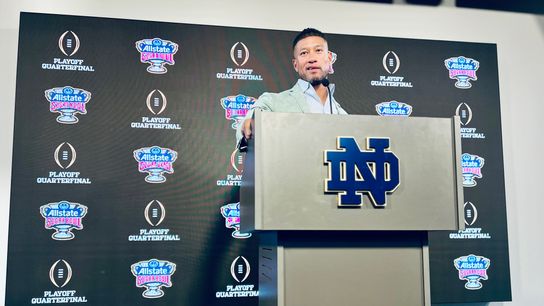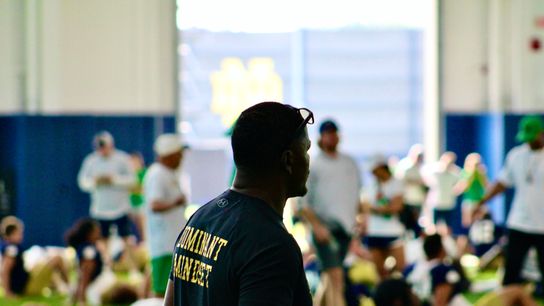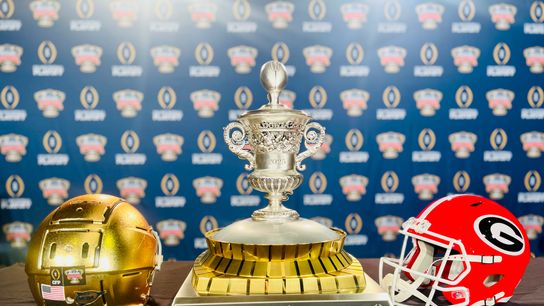NEW ORLEANS – No two teams left standing in the first-ever College Football 12-team Playoff have traveled identical paths.
So, Notre Dame charted its course to today’s Sugar Bowl quarterfinal opposite No. 2-seed Georgia with a bow and arrow, trying to stay off the guardrails on a winding toll road and with 10 assistant coaches, empowered by Marcus Freeman, delivering a week-by-week message.
A bow and arrow? Well, yes. Real illustrations and toy demonstrations.
But a toll road? Grab a spot in the passenger seat and read on.
Three years ago, in both nod to a mentor and vehicle for team messaging through his assistant coaches, Freeman began implementing a system in which an assistant coach essentially became a second head coach in game-week meetings in preparations for each opponent.
Freeman, who had learned the tactic under his college coach, Jim Tressel, shouldered the lead voice as Notre Dame opened its season on the road with a win at nationally ranked Texas A&M.
A week later following a stunning home loss to Northern Illinois, the Irish confronted a path through the remainder of their season that featured 10 more potholes, any one of them capable of ruining the program’s dreams of a first-ever CFP berth under Freeman and a first appearance since 2020.
Marty Biagi, FootballScoop’s 2024 Special Teams Coordinator of the Year, had been dealt the Purdue coach-of-the-week assignment in preseason. It became a task of immense importance 117 days ago.
Freeman sets the tone to the team on Mondays, and the designated assistant head coach of the week carries the program through Thursday, addressing the entire team for usually 10 to 15 minutes each day.
“I kind of visited with Coach Free and wanted to make sure I had the same message as him,” Biagi told FootballScoop, “but really I just wanted to make sure that we focused on the fact that we knew who the team was that we were playing that week, but the opponent was ourselves.
“So, getting ourselves to really focus in on our preparation of that week. We know who we’re going to play, but for us to keep climbing and elevating, we know who we are. I tried to focus on each day, I showed them a picture of our team as the final message so that they understood the opponent is ourselves.”
A 66-7 paving of Purdue followed, and the Irish launched a winning binge that’s now spanned 11 games and more than 15 weeks.
Messages were dispensed by all. Joe Rudolph, who molded an offensive line that began the season as Power Conference football’s most inexperienced into a Joe Moore Award finalist, handled No. 15 Louisville.
Max Bullough later was tasked with the role against then-undefeated, 24th-ranked Navy.
“I think it’s great to see how each coach approaches the game and how they view the game and how they build, I guess, a game plan or just a view of how we should approach the challenge of that week,” said Rod Heard II, a graduate-transfer safety from Northwestern who had not been exposed to the program until his lone season with the Irish. “I think it gives every coach an opportunity to express themselves, and it allowed me to learn more about the coaches, especially the coaches I don’t get to be around as much on the other side of the ball. I think it just overall breeds more connection and unity throughout the entire team; I think it’s a great thing.
“I think even outside of just that early loss, in general, how Coach Free and how the coaching staff set up things even outside of just giving one coach the head coach of the week job, the different things I’ve learned and seen while being here and learning how to build that unity and that brotherhood. I could go on and on. I think as a team, we’re very close. We all have one head, one mission, one goal.”
Al Golden, the Broyles Award finalist and architect of Notre Dame's staunch defense, handled senior day against Virginia.
"Tom O’Brien did the same thing way back in 1997 when I was at Boston College, always gave us an opportunity to address the team on Friday nights," said Golden, who dialed in a message that emphasized sending the Irish seniors out winners.
"It’s awesome, it gives everybody a big picture, allows you to talk to other positions and the other side of the ball. This way, whatever Free’s message is, big picture, it gets delivered in a different form, which keeps it fresh. You know, so however Al sees Free’s message or Mick (Mike Mickens) sees Free’s message, they bring it to life in their own personal way, and I think that’s impactful."

But it was Deland McCullough’s approach for the Irish’s first game in November, a home tilt against Florida State, and Al Washington’s creative demonstrations before Notre Dame’s showdown against CFP-ranked Army in the Shamrock Series that still resonated with Irish players down here in advance of a shot for a program-first win against Georgia. A quest now delayed until today following the deadly terrorist attack Wednesday morning here that killed 15 people and wounded at least 30 additional individuals.
A former Super Bowl-winning assistant coach with the Kansas City Chiefs who has emerged in recent seasons as a head coaching candidate, McCullough leaned into his own educational past. Turning Notre Dame’s team room in a veritable classroom inside the Guglielmino Athletics Complex, McCullough steered the Irish on his vision for the road to team glory, a message that echoed Freeman’s season-long theme.
McCullough revealed that Monday’s theme focused on the road to team glory, followed by Tuesday’s teachings on collecting fuel along that journey followed by paying tolls and concluded his week with how to navigate the road forward.
“I told the guys, I was messing with Riley Leonard and I said, ‘Did you know I was an English teacher? We’re about to go through a lesson on analogies and symbolism,’” McCullough shared with FootballScoop. “I started setting the stage in front of the room.
“We’ve got our keys to team glory, which are our keys to victory. Obviously we’ve got to have keys and where we’re trying to get to is team glory. Then I went through the fuel. What fuels us on the road to team glory? I talked about attention to detail and went through everything you do in a practice to fuel that. Earning trust. Being dependable. Being disciplined.”
The lesson continued.
“The goal is to get the team glory, and there’s tolls that all of us pay along the way, there’s things that you do that you’re on this road for,” McCullough, a five-time FootballScoop Running Backs Coach of the Year finalist, said. “Some guys are on it for respect. Some guys are on it for their love of playing football, the competition.
“But I said you can’t pay into it anything that’s self-fulfilling. Everything you pay into is towards team glory, even if it’s just kicking another guy’s ass in front of you. But it can’t be for me to be a thousand-yard rusher, for me to get interviewed, for me to get an NIL deal, for me to get a head coaching job. Those aren’t the tolls you pay.”

No, McCullough’s road also traveled with refunds.
“Once you achieve team glory, the refunds are personal glory, coaches get elevated, players get this, players get that,” he said, “but I told them, some refunds ain’t good, either. You can go through the whole process and the refund might be you get tore up in the media. The refund could be you lose your job.”
The message stayed in the rearview mirrors of the players.
“One thing he said was stay off the guardrails, missed assignments and things like that,” transfer-wideout Beaux Collins, who did not have a similar program at Clemson, said. “Bumping the guardrails means things like, ‘All right, I’m off-track a little bit, I need to get back focused.’ That was just one of my favorite things.
“It’s something that’s simple but then clearly sticks in all of our brains. Get across in the most simple ways so that guys can go apply it.”
Added Jake Tafelski, a Central Michigan transfer who now starts on Notre Dame’s kickoff-coverage unit, “I’d say Coach D’s message, he kind of talked about the toll road and stay in your lane and make sure you do the right thing. That one stuck with me the most.”
McCullough concluded the week with a simulated situation that left him riding in the passenger seat with star tailback Jeremiyah Love at the wheel.
“It’s kind of funny how I laid it out to them, I said, ‘Here you are on the road, and understand this. It’s you and your (position) coach in the car. Jeremiyah (Love), you’re driving, you’re in the game and I’m sitting in the passenger seat,” McCullough said, “and you hit a guardrail, which means you had an error. When we stop that car, there’s two people who are likely going to be walking up to the car and knocking on the window. It’s going to be the O.C., or it’s going to be the head coach. While they’re walking up, I’m going to lean over to you and say, ‘Did you know what you were supposed to do? Did you understand what you were supposed to do? Are you physically capable of doing it?’ And you’re going to say, ‘Yes’ to all of them.
“So, then I’m going to ask, why did you hit the guardrail. Simultaneously when that happens, those coaches aren’t going to knock on your window; they’re going to knock on mine. And they’re going to look at me and ask, ‘Are you coaching it? Or are you allowing it? Are you coaching it or allowing it?’ It’s going to be uncomfortable. Those are uncomfortable questions. Me having to answer those questions is uncomfortable. So, I told the guys having those guardrails are like your conscience, so I coach to stay off the guardrails, I coach to not have somebody asking me, ‘Are you coaching it or allowing it?’. And that’s why I’m on you guys.”
In the team’s penultimate regular-season game, against longtime foe Army, Washington brought out the weaponry. He even trained with a South Bend, Indiana-area archery instructor for his game, er, lesson-planning. Brought in a toy, suction-cup bow and arrow for players to demonstrate their aim.
“I went back to the beginning of time. The bow-and-arrow changed nations,” said Washington. “At that time, those eras, until the gun came around, that was the tilt. The archer himself, it’s even in the bible, the archer is a powerful role in those times and you think about something used back in those times and still today. The best archers, it’s all about focus, technique. We got into it.
“The guy who taught me, his name’s Henry, he told me it’s therapeutic. You just let that joker go. I kind of got into it.”
So, too, did a player who already owns a national championship ring: Irish lacrosse star/wideout Jordan Faison.
“I would probably say my favorite was Coach Wash’s, he brought out the big bow and arrow,” Faison said. “Kind of going through the whole process of how we’re similar to the bow and arrow, about the draw, the preparation, the pullback and the aim and accuracy. I really liked that message, it got me going.”
Those are the very elements Freeman envisioned.
"It originated from when I was in college, Coach Tressel did something similar where each week, we called it in an opponent expert,” said Freeman, who would improve to 18-2 in his last 20 games as head coach with a win against Georgia. “An assistant coach was supposed to be the expert of your upcoming opponent. I thought it was a great way as a player to hear somebody else's voice, to hear some of your assistant coaches in front of the entire team.
"And as a coach, it's a great way for me to empower our coaches and give them the opportunity to be in front of the whole team, which not everybody gets the chance to do. And it's been great. They embrace it. They really look forward to it, and I think our players enjoy it.”
It’s left an imprint on those assistant coaches, too. McCullough remembered hearing from star linebacker JD Bertrand after his turn in the role prior to Notre Dame’s win against BYU in Las Vegas during the 2022 season.
“I think it’s great because guys get to hear different messages,” McCullough, who’s helped his running backs travel for 1,000 or more yards’ offense 16 times since 2011, said. “I remember a few years ago when we played BYU, and I was coach of the week. JD Bertrand walked up to me at that time and said, ‘This is unbelievable, man. We don’t get to hear you guys. We hear you’re a good coach and we know your players, but we don’t get to hear your message, your tone and the way you deliver it and motivate a group.’”
The arrow's pointed forward, the road to team glory is still open. Only if Notre Dame beats Georgia does that path remain.
